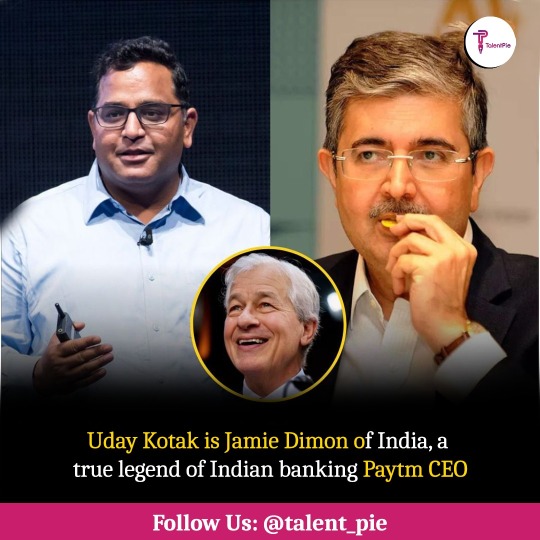#paytm founder
Text
विजय शेखर शर्मा का Paytm Payments Bank के अध्यक्ष, बोर्ड सदस्य पद से इस्तीफा
New Delhi: प्रमुख वित्तीय सेवा कंपनी पेटीएम ने सोमवार को कहा कि उसके संस्थापक और सीईओ विजय शेखर शर्मा ने पेटीएम पेमेंट्स बैंक लिमिटेड (PPBL) के गैर-कार्यकारी अध्यक्ष और बोर्ड सदस्य के पद से इस्तीफा दे दिया है, क्योंकि भारतीय रिजर्व बैंक (RBI) बैंक के परिचालन पर प्रतिबंध लगाने के करीब पहुंच गया है।
बीएसई फाइलिंग में कंपनी ने कहा कि पीपीबीएल ने सेंट्रल बैंक ऑफ इंडिया के पूर्व अध्यक्ष श्रीनिवासन…

View On WordPress
0 notes
Text
Former Paytm, NPCI, and UIDAI CXO Sanjay Saxena Joins CIFDAQ as Co-Founder and CEO, India and South East Asia (SEA) Operations
CIFDAQ Blockchain Ecosystem Ind Limited, a Fintech New Age Blockchain company dedicated to transforming the blockchain landscape through its pioneering approach to crafting a scalable, comprehensive artificial.
Intelligence-powered blockchain ecosystem for enhanced security in exchanges and MPC wallets, we proudly welcome Sanjay Saxena as Co-Founder and CEO, India and South East Asia (SEA)…

View On WordPress
0 notes
Text
“Paytm Payments Bank Executives Seek New Opportunities as Uncertainty Spooks Them; Rush to Recruiters for Job Security”
Recruiters are being flooded with resumes and job applications from employees of Paytm Payments Bank and its parent firm One97 Communications, who fear there could be more regulatory trouble ahead for the digital-payments company.
Employees across levels in tech, merchant banking, sales and marketing are ready to take pay cuts elsewhere at a time when offers are hard to come by.
The flood of resumes began after the Reserve Bank of India cracked the whip on Paytm Payments Bank last week for failing to implement process changes despite repeated warnings about falsified compliances, and irregularities in KYC norms and related-party transactions.
Meanwhile, at a virtual town hall on Saturday, the company’s founder and chief executive Vijay Shekhar Sharma tried to assuage employees’ fears about the future of the group, which employs about 35,000 people.
“Given the withdrawal of Paytm from the small-ticket lending business there was a significant layoff of employees very recently and our marketplace received resumes from them,” said Ramachandran A, CEO of MyRCloud, an AI/ML-driven recruitment marketplace.
“However, after the RBI statement on Paytm, we are seeing CVs from different sets of talent including data science, back-end engineers and other tech talent coming in.”
The platform, which has about 1,500 recruiters, has seen a few hundred resumes uploaded over the past week. “Partners on our platform have received 300-400 CVs, largely from juniors to middle management,” Ramachandran told Mint.
Sharma and senior leadership told employees during Saturday’s town hall that their jobs were safe and only performance-based retrenchment was being done.
According to a company executive, Sharma said during the hour-long town hall that the company was in touch with RBI and that the regulator’s action would have a worst-case impact of ₹300-500 crore on its annual Ebitda.
In response to Mint’s queries, Paytm said the questions were speculative

While junior and middle management employees of the company are looking for jobs in the banking and finance sector, senior candidates doing so will have to revisit their stock offers when negotiating compensation with other firms.
“Some of the established fintechs – especially payment-solutions firms – attract leadership talent with a combination of fixed and variable pay, and stock options. These stock options could run into crores, which is making it hard for some employees to find other opportunities easily,” said Upasana Agarwal, partner for professional and financial services at ABC Consultants, an executive search and talent advisory firm.
A partner at another recruitment firm that has placed senior level executives from One97 Communications said middle and senior management have been reaching to them since last year.
“The company retrenched employees over the past few months and candidates reached out for jobs. Many of Paytm’s employees draw salaries that are higher than the market rate and will have to take a pay cut,” the partner added.
Paytm’s parent firm said, however, that it expects to continue improving its profitability. Sharma told analysts and investors on Thursday that the RBI’s restrictions were a “speed bump”.
In a blog post, the company cited a post by Sharma on X, in which he wrote, “To every Paytmer, your favourite app is working, will keep working beyond 29 February as usual.”
1 note
·
View note
Text
Unstoppable Momentum: The Magic of Idea Traction
If you are not getting traction on your idea, you try few things. You try pushing harder, cleaning up something, building up to something aggressively- but if it doesn’t get traction, then don’t bother. -Vijay Sharma, Founder of Paytm
Vijay Sharma, Paytm's founder, has a key message: if your idea isn't taking off, it's okay to stop pushing. Even with extra effort or changes, sometimes it doesn't click. It's wise to keep trying, but it's also fine to move on if it's not working.
Instead of wasting energy, focus on ideas with better potential. It's about being smart and knowing when to switch gears.
Empowering Tip: Be adaptable and open to change, you can increase your chances of success and avoid wasting time on ventures that aren't meant to be.
#startuplife #entrepreneurtips #businessstrategy #business #businesstips #Nimixo #motivationalquotes #MotivationBlowByBlow #motivationtuesday
0 notes
Text
Paytm gets five handles to continue UPI transactions, existing one to continue

Fintech firm One97 Communications, owner of the Paytm brand, has got five handles in partnership with four banks to continue UPI transactions, as per an update on the NPCI website.
The company's existing handle @paytm is among the five handles that users can continue using without the need to make any changes at their end.
National Payments Corporation of India (NPCI) has approved @paytm and a closed user group UPI handle @ptyes for Paytm in partnership with Yes Bank.
NPCI has also approved @pthdfc with HDFC bank and @ptsbi with State Bank of India as a partner. However, these two handles are not active immediately.
Paytm spokesperson said users can continue to use @paytm handle seamlessly without the need to make any changes at their end.
On March 14, NPCI approved a third party application (TPAP) provider permit for Paytm in collaboration with SBI, Axis Bank, Yes Bank and HDFC bank for continuity of UPI transactions for the company's users.
Paytm's UPI transactions were earlier being carried out through Paytm Payments Bank (PPBL) that has been barred by the Reserve Bank of India from accepting deposits, credit transactions, or top-ups in any customer accounts after March 15.
One97 Communications Limited (OCL) holds a 49 per cent stake in PPBL, while company's Founder and CEO Vijay Shekhar Sharma holds 51 per cent stake in the beleaguered bank.
Source : Paytm gets five handles to continue UPI transactions, existing one to continue
1 note
·
View note
Text
Tracking the Growth Trajectory of Tech Startups for Investment Opportunities
In today's fast-paced digital age, investing in tech startups has become increasingly popular. With the potential for substantial returns and the opportunity to be part of groundbreaking innovations, many investors are eager to dip their toes into this dynamic sector. However, finding the right tech startups to invest in can be a daunting task, especially for those new to the venture capital landscape. In this blog, we'll explore where you can find valuable information on tech startups to invest in, delve into the landscape of venture capital firms in India, and discuss how you can effectively invest in startup companies.

Researching Tech Startups to Invest In - When it comes to finding promising tech startups to invest in, thorough research is key. Fortunately, there are several resources available to help investors identify potential opportunities. One of the most popular platforms for discovering startups is Crunchbase. With its extensive database of companies, investors can easily filter through various sectors, funding rounds, and geographic locations to find startups aligning with their investment criteria. Additionally, platforms like AngelList provide curated lists of startups actively seeking funding, making it easier for investors to connect with promising ventures.
Furthermore, staying updated with industry news and trends can also offer valuable insights into emerging tech startups. Websites such as TechCrunch and VentureBeat often feature profiles and interviews with founders, giving investors a glimpse into the vision and potential of different companies. Following influential investors and thought leaders on social media platforms like Twitter can also provide valuable information and networking opportunities within the startup ecosystem.
Venture Capital Firms in India - India has emerged as a vibrant hub for tech startups, attracting attention from both domestic and international investors. With the rise of successful unicorns like Flipkart, Paytm, and Zomato, the Indian startup ecosystem continues to garner significant interest from venture capital firms. Some prominent venture capital firms operating in India include Sequoia Capital India, Accel Partners India, and Nexus Venture Partners, among others.
These venture capital firms play a crucial role in nurturing and funding early-stage startups, providing them with the necessary resources and guidance to scale their businesses. By tapping into their networks and expertise, investors can gain access to a diverse portfolio of promising tech startups in various stages of growth.
How to Invest in Startup Companies – The process of how to invest in startups companies requires a strategic approach and a willingness to embrace risk. Before diving in, it's essential to assess your risk tolerance, investment goals, and timeframe. While some investors prefer to take a hands-on approach by directly investing in individual startups, others may opt for a more diversified approach through venture capital funds or angel syndicates.
For those interested in direct investment, platforms like AngelList and SeedInvest offer opportunities to participate in early-stage funding rounds alongside seasoned investors. Conducting thorough due diligence, evaluating the team, market potential, and competitive landscape are crucial steps in mitigating risks and maximizing returns.
Alternatively, investing through venture capital funds allows investors to gain exposure to a diversified portfolio of startups curated by experienced fund managers. These funds often provide expertise in deal sourcing, due diligence, and portfolio management, offering investors a more passive yet diversified approach to startup investing.
Discover Opportunities with Krystal Ventures - In the realm of startup investing, navigating the vast landscape of opportunities can be overwhelming. That's where platforms like Krystal Ventures Studio come in. By leveraging technology and data analytics, Krystal Ventures connects the needs of startups with the interests of investors, facilitating seamless matchmaking and fostering mutually beneficial relationships.
Whether you're a seasoned investor or a novice looking to dip your toes into the world of tech startups, Krystal Ventures provides a curated platform to discover and engage with promising ventures. With its extensive network and innovative approach to startup investing, Krystal Ventures empowers investors to make informed decisions and participate in the exciting journey of entrepreneurial growth.
The quest to find information on tech startups to invest in requires diligence, research, and a strategic approach. By leveraging resources like Crunchbase, staying abreast of industry trends, and tapping into the expertise of venture capital firms, investors can identify promising opportunities in the ever-evolving startup landscape. And with platforms like Krystal Ventures facilitating connections and streamlining the investment process, the journey towards investing in tech startups becomes even more accessible and rewarding.
#vc firms in india#how to invest in startups for equity#tech startups to invest in#venture capital firms in india#top venture studios
0 notes
Text
Paytm’s Vijay Shekhar Sharma Resigns from Payments Bank Board

New Delhi: Vijay Shekhar Sharma, the founder of Paytm, has stepped down as the part-time non-executive Chairman of Paytm Payments Bank Limited (PPBL) ahead of the March 15 deadline to cease its operations.
PPBL has announced a reshuffle of its Board of Directors, appointing Ex-Central Bank of India Chairman Srinivasan Sridhar, former Executive Director of Bank of Baroda Ashok Kumar Garg, retired IAS officer Debendranath Sarangi, and former IAS officer Rajni Sekhri Sibal, One 97 Communications Limited.
Read More - https://apacnewsnetwork.com/2024/02/paytms-vijay-shekhar-sharma-resigns-from-payments-bank-board/
0 notes
Text
How is Paytm share price expected to open today?
New Post has been published on https://petn.ws/NOWPf
How is Paytm share price expected to open today?
Paytm share price will be in focus on Tuesday after the fintech giant informed that its founder Vijay Shekhar Sharma has resigned from the board of its associate Paytm Payments Bank. One97 Communications, the parent company of Paytm, on Monday said that it has withdrawn its nominee from the Paytm Payments Bank Board and Vijay […]
See full article at https://petn.ws/NOWPf
#OtherNews
0 notes
Text
Alibaba Revolutionizing E-commerce in China and Beyond

How has Alibaba revolutionized e-commerce in China as well as the wholesale market worldwide?
In the world of e-commerce, few organizations have made as considerable an impact as Alibaba Group Holding Limited. Founded in 1999 by means of Jack Ma, AB has grown into an e-commerce large that has now not most effectively converted the way commercial enterprise is completed in China however has also had a profound effect on the worldwide e-commerce panorama. This article explores the rise and evolution of Alibaba, its effect on e-commerce in China, and its enlargement into global markets.
Introduction

The story of Alibaba (AB) is a testimony to the strength of entrepreneurship, innovation, and the capacity to tap into the huge potential of a growing virtual economy. What began as a small online marketplace connecting Chinese producers with global consumers has advanced right into a conglomerate that encompasses e-commerce, cloud computing, digital leisure, and more. AB’s adventure is a case look at how a visionary chief, strategic thinking, and deep information of the market can cause exceptional success.
The Early Days of Alibaba

Alibaba is based in Hangzhou, China, via Jack Ma, a former English teacher with a passion for entrepreneurship. Ma’s vision changed to create a platform that might make it less complicated for small and medium-sized Chinese manufacturers to get the right of entry to worldwide markets. In 1999, he and a group of co-founders released Alibaba.com, a business-to-commercial enterprise (B2B) online marketplace.
The timing changed into fortuitous. China was experiencing a speedy monetary increase, and there was a developing demand for Chinese items internationally. However, many small manufacturers lacked the assets and know-how to reach global shoppers. Alibaba’s platform bridged this hole by means of imparting a virtual marketplace in which these manufacturers could showcase their products to an international target audience.
Alibaba’s Key Milestones

To understand AB’s effect, it is essential to focus on a few key milestones in its history of commerce
Alibaba.Com
The launch of Alibaba.com in 1999 marked the agency’s first foray into e-commerce. It allowed Chinese manufacturers to list their merchandise and hook up with customers from around the world.
Taobao
In 2003, AB introduced Taobao, a consumer-targeted online market that allowed people and small organizations to shop for and sell items. Taobao fast won a reputation and has become a dominant force in China’s e-commerce market.
Alipay
Recognizing the want for a secure online fee machine, Alibaba launched Alipay in 2004. Alipay is now not the most effective facilitated transaction on AB’s systems. However, additionally has become a leading virtual fee company in China.
Tmall
In 2008, AB launched Tmall (previously Taobao Mall), a premium model of Taobao centered on emblem-call merchandise. Tmall attracted established brands and helped fight counterfeiting issues.
Singles’ Day
It grew to become China’s Singles’ Day, a traditional excursion for singles, into the arena’s biggest purchasing event. The November eleventh sale has constantly damaged statistics, with billions of greenbacks in income every 12 months.
Alibaba Cloud
Realizing the capability of cloud computing, AB entered the cloud services marketplace with Alibaba Cloud (Aliyun) in 2009. It has been considered to be a major player within the worldwide cloud industry.
International Expansion
AB improved its presence in China, making an investment in and obtaining companies in diverse international locations, including the acquisition of Lazada in Southeast Asia and investments in the Indian e-commerce organization Paytm.
Impact on E-commerce in China

Alibaba’s impact on e-commerce in China has been profound and far-accomplishing
Market Dominance
It’s structures, together with Taobao and Tmall, have dominated China’s e-commerce market, accounting for a considerable share of online retail sales.
Rural E-commerce
AB has played a pivotal role in bringing e-commerce to rural areas of China. Projects like the “Rural Taobao” application, have helped rural companies and farmers get admission to national and global markets.
Digital Payment Revolution-commerce
Alipay, a subsidiary of AB, has revolutionized digital bills in China. It is extensively used not handiest for e-commerce transactions but also for diverse financial services.
Innovation
AB has been at the leading edge of e-commerce innovation, from introducing virtual storefronts to imposing augmented fact (AR) buying experiences.
Small Business Empowerment
AB’s systems have empowered countless small agencies and entrepreneurs, providing them with get admission to to a vast client base and the equipment to develop their brands.
Alibaba’s Global Expansion

While Alibaba’s achievement in China is undeniable, the organization has additionally set its sights on worldwide markets
Investments in Southeast Asia
AB has made strategic investments in e-commerce, logistics, and virtual payment organizations in Southeast Asia, strengthening its presence inside the region.
Partnerships
The business enterprise has entered partnerships with global outlets and brands to facilitate move-border e-commerce and increase its international product services.
Alibaba Cloud
AB Cloud has extended its information centers and services globally, positioning itself as a first-rate participant in the international cloud computing marketplace.
Global Shopping Festivals
AB has introduced Singles’ Day and other purchasing galas to international audiences, creating opportunities for worldwide manufacturers to participate.
E-commerce Platforms
AB has released e-commerce systems catering to global customers, such as AliExpress, allowing Chinese sellers to reach an international customer base.
Challenges and Controversies for Alibaba
Despite its achievement, AB has confronted its share of challenges and controversies
Counterfeit Goods
The sale of counterfeit and low-excellent merchandise on Alibaba’s platforms has been a continual problem, leading to worries approximately customer protection and brand integrity.
Regulatory Scrutiny
The Chinese authorities have accelerated regulatory scrutiny of AB, resulting in fines and regulatory changes aimed at curbing monopolistic conduct.
Geopolitical Tension
Alibaba, like different Chinese tech giants, has faced geopolitical tensions that have complicated its worldwide growth efforts.
Conclusion
Alibaba’s adventure from a small start-as much as a worldwide e-commerce giant is an exquisite testament to the transformative electricity of innovation and entrepreneurship. It has now not only revolutionized e-commerce in China but has additionally made large inroads into worldwide markets. With various atmosphere that includes e-commerce, cloud computing, virtual bills, and more. It continues to form the future of the digital economic system.
As Alibaba faces new challenges, including regulatory scrutiny and extended opposition. Also, its potential to adapt and innovate can be essential to its persevered fulfillment. Nevertheless, the tale of Alibaba remains a concept for marketers and business leaders globally, illustrating what can be executed through vision, willpower, and deep expertise in the evolving digital panorama.
Digital Marketing Services , SEO and E-Commerce Solutions in Delhi, India
Author – Farhanul Haque
This article is written by the Founder of Digitamizer who has been working in the e-Commerce Sector Since 2006 and is also a certified Digital Marketing Professional from IIT, Delhi, India.
0 notes
Text
Ashneer Grover on Paytm Crisis: 60-year-olds running RBI do not...
Ashneer Grover, Founder of BharatPe criticised the RBI for ‘punitive action’ against Paytm Payments Bank, calling it an ‘overreach’ that sends the message that banks are important but fintechs are not.

View On WordPress
0 notes
Text
LIST OF STARTUPS FUNDED BY RATAN TATA

Ratan Tata is a well-known industrialist and philanthropist in India. Ratan Tata is awarded the highest civilian award of India, the Padma Vibhushan (2008) and Padma Bhushan (2000) for his good deeds. He is the former chairman of Tata Sons. Ratan Tata has invested in over 30 startups related to various sectors in his personal capacity. Some of the startups emerged as successful giants in their respective sectors and proved his extraordinary vision and investment style.
Here is the list of some of the startups which emerged as a successful giant and were funded by famous business industrialist Ratan Tata:

Paytm is one of the leading fintech start-ups in India. Paytm was founded by Vijay Shekhar Sharma in the year of 2010. Paytm allows users to do a number of transactions such as making transfers, paying bills, recharge, etc. is based in Noida, a region adjacent to New Delhi. Ratan Tata invested an undisclosed amount in the company back in the year 2015 and take up a stake in One97 communication which is the parent company of Paytm. With this funding, he took a position on the board as a Business advisor.

Ola t is a unicorn startup company with a current valuation of US$ 6Bn was founded in the year 2010. The founders of the unicorn company are Bhavish Aggarwal and Ankit Bhati. The headquarters is situated in Bangalore, Karnataka. The ride-sharing company offers its services not only in India but in Australia, the UK, and New Zealand also. Ratan Tata invested in the company in the year 2015 in his personal capacity. Tata’s venture capital firm RNT Capital Advisors also made an investment of Rs 400 Crore in Ola.

Ratan Tata has also invested in Xiaomi which has become the third-largest phone manufacturer in the world, although the amount was not disclosed. Xiaomi is a Chinese multinational company that was founded in the year 2010 by lei Jun. Xiaomi made its presence in the Indian market in 2014. It is a surprising and interesting fact that RatanTata is the first Indian who bought a stake in Xiaomi. Xiaomi is a very popular brand in India known for its cheap price and high tech features.

Snapdeal is an Indian e-commerce giant that became the first tech company to secure funding from Ratan Tata. Snapdeal, India’s one of the largest marketplace was founded in the year 2010 by Kunal Bahl and Rohit Bansal. In 2014, Ratan Tata invested less than Rs. 5 crores by picking up a 0.17% stake in Snapdeal.
To read more, Click the link below
0 notes
Text
Paytm Payments Bank app post-February 29. To address these concerns, Vijay Shekhar Sharma

In the wake of the Reserve Bank of India’s (RBI) stringent actions against Paytm Payments Bank, apprehensions have surfaced among numerous customers regarding the functionality of the Paytm app post-February 29. To address these concerns, Vijay Shekhar Sharma, the founder of Paytm, explicitly stated that the app’s operation will persist even if PPB ceases operations.
Vijay Shekhar Sharma emphasized that the recent directives from RBI are solely targeted at the operations of Paytm Payments Bank and do not affect the overall functionality of the Paytm application. It’s crucial for users to understand that Paytm and PPB are distinct entities with independent functionalities.
Madhur Deora, the President and Group CFO at Paytm, reiterated this point, emphasizing that Paytm and Paytm Payments Bank should not be perceived as a unified entity. Deora clarified that, structurally and by design, they are separate entities. PPB operates as an associate company and follows the governance principles applicable to banks, with an independent management team reporting to the board.
Despite the regulatory scrutiny on Paytm Payments Bank, Paytm, as a standalone application, will continue to provide its users with seamless services. The distinction between Paytm and its associated bank is fundamental, ensuring that the functionality of the app remains unaffected by the regulatory actions against the bank.
RBI’s Directive Against Paytm Payments Bank
The Reserve Bank of India is currently contemplating the cancellation of the operating license for Paytm Payments Bank, a subsidiary of Paytm, once the safeguarding of depositors’ funds is ensured. This decision is expected to be executed by February 29, subject to the banking regulator’s final determination.
Following the stipulated date, PPB is anticipated to restrict customers from making further deposits into their savings accounts or the widely-used digital payment wallet. However, it’s important to note that RBI has not yet reached a final decision on this matter, and further updates are awaited.
The regulatory action by RBI stems from various violations observed in the functioning of PPB. These infractions include the misuse of customer documentation rules and the non-disclosure of material transactions. Of particular concern to RBI is the large number of Paytm bank users who have not yet submitted their Know Your Customer (KYC) documents, raising red flags about potential money laundering activities.
While the regulatory landscape for PPB is undergoing scrutiny, Paytm app users can rest assured that the app’s services will continue uninterrupted. The clarity provided by Vijay Shekhar Sharma and Madhur Deora emphasizes the separation of Paytm and PPB, assuring users that the issues facing the bank do not impede the functioning of the widely-used digital payments application.
For more such News Kindly Check blogoday.com
1 note
·
View note
Text
The Rising Significance Of NBFC Co-Branded Credit Cards
Non-Banking Financial Companies (NBFCs) are increasingly finding innovative ways to enhance their product offerings. One such game-changer is the introduction of co-branded credit cards. This strategic collaboration between NBFCs and traditional banks has set the stage for a financial revolution, offering consumers a unique and powerful tool for managing transactions and expenses.
The Genesis Of Co-Branded Credit Cards
Empowering Transactions, Redefining Credit
Co-branded credit cards mark a significant shift in the financial paradigm. With digital payments gaining traction, these cards have emerged as a welcomed addition to the product arsenal. Vijay Shekhar Sharma, the founder of Paytm, predicted a payment revolution during the launch of their co-branded credit card in partnership with SBI. The prophecy is simple yet powerful: credit will emerge as the mainstream choice for transactions. This strategic alliance showcases the potential of co-branded credit cards to redefine how we view and use credit in our day-to-day lives.

Also Read: How to Recognize the Optimal Lender for Your Loan Application
What Sets Co-Branded Credit Cards Apart?
Seamless Integration, Enhanced Benefits
Co-branded credit cards seamlessly integrate into the digital payment ecosystem, offering users a versatile tool for everyday transactions. Unlike traditional credit cards, co-branded ones come with additional perks and benefits. These perks often include exclusive discounts, rewards, and cashback offers, making every swipe more rewarding for the cardholder.
NBFCs And Traditional Banks Join Forces
Synergy In Action
The success of co-branded credit cards lies in the synergy between NBFCs and traditional banks. This partnership brings together the financial expertise of traditional banks with the agility and innovation of NBFCs. The result is a powerful financial tool that caters to the diverse needs of consumers. Abhay Bhutada, MD of one of the top NBFCs in the country, emphasizes the transformative impact of such collaborations on the financial landscape.
Co-Branded Credit Cards As A Game-Changer
Beyond Transactions
Co-branded credit cards are not just about transactions; they represent a key to the future of payments. The enhanced benefits, coupled with the ease of digital transactions, make these cards an attractive choice for the modern consumer. As the financial world evolves, co-branded credit cards position themselves as a game-changer, offering users a pathway to financial freedom and flexibility.
Also Read: Combating Financial Fraud: Innovations in Banking and NBFCs
Understanding The Unique Needs Of Users
Tailored Solutions, Enhanced User Experience
One of the notable features of co-branded credit cards is their consumer-centric approach. Unlike generic credit cards, these cards are often designed to cater to specific user needs. Whether it's travel, shopping, or entertainment, co-branded cards offer tailored solutions that resonate with the lifestyle and preferences of the cardholder.
Co-Branded Credit Cards And Financial Inclusion
Expanding Horizons, Bridging Gaps
The future of co-branded credit cards looks promising, with the potential to drive financial inclusion. As these cards become more prevalent, they have the capacity to reach a broader demographic, providing financial services to those who were previously underserved. The inclusive nature of co-branded credit cards aligns with the vision of financial experts like Warren Buffett, who emphasizes the importance of creating financial solutions accessible to all.
Embracing Innovation
Adapting To Change, Shaping The Future
Innovation is key. Co-branded credit cards represent a significant step towards embracing the digital transformation that is sweeping the financial industry. These cards not only adapt to the changing needs of consumers but also actively shape the future of financial services, ushering in an era where convenience, security, and benefits converge.
Also Read: Importance Of Transparency And Customer Trust In Digital Lending

Conclusion
As co-branded credit cards become a welcome addition to the financial toolkit, they signal a shift towards empowered transactions and enriched lives. Vijay Shekhar Sharma's foresight and the strategic alliance between Paytm and SBI underscore the transformative potential of these cards. With top players like Abhay Bhutada present in the business, co-branded credit cards are poised to become not just a card but a catalyst for a new era in payments—a future where credit is more than just a transaction; it's a key to financial freedom.
0 notes
Text
The Buzz Around NBFC Co-Branded Credit Cards
With influential figures endorsing their potential, NBFC co-branded credit cards are emerging as the new superheroes, transforming the way we handle transactions. Their evolution from conventional plastic to personalized gateways signifies a transformative era in the payment ecosystem. As influential figures continue to champion their potential, these cards are not merely financial instruments but catalysts for a revolution that is reshaping the very fabric of how we handle transactions. It's time to embrace the magic they offer and step into a future where co-branded credit cards become an integral part of our financial journey.
The Rise Of Co-Branded Credit Cards
Co-branded credit cards are not your average pieces of plastic; they're more like personalized magic wands. What sets them apart is the collaboration between Non-Banking Financial Companies (NBFCs) and established players in various industries. This fusion brings forth a card that not only offers financial perks but also aligns with the lifestyle and preferences of the cardholder.
Abhay Bhutada, Poonawalla Fincorp’s MD, believes that co-branded credit cards are more than just a financial instrument. According to him, these cards complement the existing product basket, turning the NBFC into an active participant in the payment ecosystem. It's a strategic move that resonates with the changing dynamics of how we transact in the digital age.

Also Read: How Can Tax Relaxations Help NBFCs Come On Par With Banks?
The Paytm-SBI Connection
When Vijay Shekhar Sharma, Paytm's founder, spoke about a payment revolution during the launch of their co-branded credit card with SBI, it wasn't just rhetoric. This collaboration signifies a leap into a future where credit becomes the mainstream choice for everyday transactions. Paytm's move showcases the immense potential co-branded credit cards hold in reshaping our payment landscape.

Tailored To Perfection
One of the key features of NBFC co-branded credit cards is their personalized touch. These cards aren't one-size-fits-all; they cater to the specific needs and preferences of the cardholder. Whether it's travel, shopping, or dining, these cards come with perks that align with your lifestyle. It's like having a financial sidekick that knows your every preference.
Also Read: What Is A Repo Rate?
The Allure Of Rewards And Benefits
Imagine getting discounts on your favorite brands, exclusive access to events, and cashback on your regular expenses – that's the magic co-branded credit cards bring to the table. These cards are not just about spending; they're about enjoying a little extra for every rupee you invest. It's like having Warren Buffett's investment wisdom at your fingertips, guiding you towards financial gains.
In the words of Abhay Bhutada, co-branded credit cards will be a welcome addition to their product offerings, elevating Poonawalla Fincorp's role in the payment ecosystem. It's not merely a financial tool; it's a strategic move towards becoming an integral part of the daily financial transactions of the customers.
The Future Is Contactless
In today's world, where making things easy is super important, NBFC co-branded credit cards are doing something really cool. They've got this amazing feature called contactless payments. Imagine this: you just tap your card, and boom, your payment is done! It's like magic. This modern way of doing things fits perfectly with the fast changes happening in digital payments. Now, every time you buy something, it's quick and smooth. It's not just a tech upgrade; it's like a whole new way we deal with money stuff!
Also Read: Why Digital Lending Is A True End-to-End System
Conclusion
NBFC co-branded credit cards don't merely serve as financial tools; they manifest as true superheroes, simplifying the complex narrative surrounding our monetary transactions. Far beyond being mere pieces of plastic, these cards symbolize strategic maneuvers aimed at reshaping and redefining our relationship with credit.
As the world eagerly anticipates the impending payment revolution, the enchantment of co-branded credit cards subtly and seamlessly integrates into the fabric of our daily lives. These cards become more than just conduits for transactions; they embody a paradigm shift in our approach to financial interactions, seamlessly blending into our routines and transforming the way we perceive and utilize credit.
0 notes
Text
Vijay Shekhar Sharma: Pioneering The Digital Revolution With Paytm
In the fast-paced world of digital innovation and financial technology, few names stand out as prominently as Vijay Shekhar Sharma, the visionary founder, and CEO of Paytm. His journey from a small town in India to becoming a trailblazer in the digital payment industry is a testament to his determination, entrepreneurial spirit, and commitment to transforming the way India and the world transact and manage their finances.
Education
He was born in Aligarh, a city in the northern Indian state of Uttar Pradesh, in 1973. His early life was marked by a strong desire to learn and achieve despite limited resources. After completing his schooling, he went on to pursue a bachelor’s degree in electronics and communications engineering from the Delhi College of Engineering, now known as Delhi Technological University.
To read More About Vijay Shekhar visit Nishant Verma Website.

0 notes
Text

Paytm founder and CEO Vijay Shekhar Sharma equated the founder of Kotak Mahindra Bank, Uday Kotak, to the CEO of banking giant JP Morgan, Jamie Dimon.
Sharing an old article on the history and legacy of Kotak, Sharma wrote on X, "I call fondly sir, our Jamie Dimon of India. A true legend of Indian Banking."
While answering a question from a young founder in the audience at the Global Fintech Fest 2023, he also said that if he hadn't launched Paytm, he would have started a business with electric vehicles (EV).
#kotak #bank #paytm #ceo #company #news #banking #IndianBank #talentpie #LatestNews #instagram
0 notes